K.E. Lanning's Blog
October 13, 2024
A proof-of-concept short film? Here we go!

Scene from the miniseries, Where the Sky Meets the Earth
Recently I was approached by director/screenwriter, Michael Ivey, from my screenwriting group, Virginia Screenwriters’ Forum, and by golly, it looks like we’re going to take a whirl at filming the award-winning short, In the Wilderness, including Top Select Finalist at the Richmond International Film Festival! In the Wilderness is adapted out of a miniseries I’ve written, Where the Sky Meets the Earth, and we’ll use the short to promote the series to producers. I’ve included below a short video we plan to use for a Seed & Spark Crowd Funding site. Wish me luck and stay tuned for updates!
In the Wilderness, a short script adapted from an intense scene out of the proposed miniseries, Where the Sky Meets the Earth.
July 15, 2024
Hot News for Hot Times...

Posters for In the Wilderness and Where the Sky Meets the Earth
My short screenplay, In the Wilderness (a scene out of my Where the Sky Meets the Earth miniseries) is a TOP FINALIST in the Richmond International Film Festival!! And to sweeten the pot, the pilot screenplay for the miniseries, Where the Sky Meets the Earth, was also honored as a Semi-finalist in the Richmond International Film Festival -- WOOHOO! Many thanks to the judges, RIFF, and especially my awesome critique group, Virginia Screenwriters' Forum!!!
April 12, 2024
AI has no soul...

AI is a double-edge sword—it will improve productivity, and if kept in that lane—will benefit humankind. But a creator of true art? Not so much, because the truth of it — AI has no soul. It can mimic humans, but AI has no human-based instinct, no hormones driving it passionately toward love or hate. By drawing from a million flecks of old thoughts stashed on the internet, it can daub a painting, pen a derivative novel or a formula screenplay, but in the end will humans really care? Did AI draw in a breath at the sight of a lovely bloom on a spring walk? Or shiver at a first kiss?
As I finished my epic journey through Marcel Proust’s À La Recherche du Temps Perdu or In Search of Times Lost [published between 1913-1927], written as a fictional auto-biography, I came to a poignant section as he contemplated his own writing career, grappling with the concept of human context and perception that is unique to each individual. As I read it, it seemed, incredibly, to talk of our current conundrum with Artificial Intelligence.
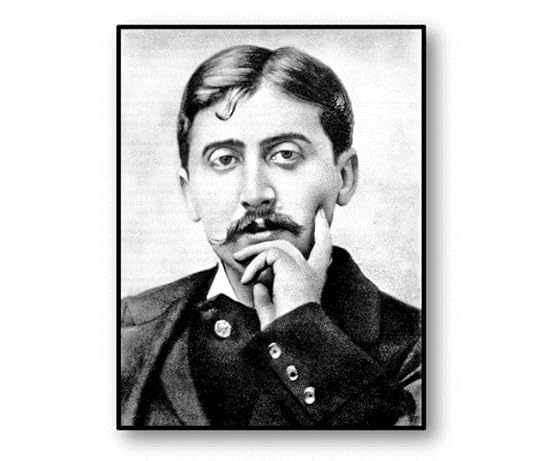
Marcel Proust, by photographer Otto Wegener
Excerpt from a section of ‘In Search of Times Lost,’ [English translation 1922-1931]:
…was not nature herself a beginning of art, she who had often allowed me to know the beauty of something only a long time afterwards and only through something else—midday at Combray through the sound of its bells, the mornings at Doncières through the hiccoughs of our hot-water furnace? The relationship may be uninteresting, the objects mediocre and the style bad, but without that relationship there is nothing. The literature that is satisfied merely to ‘describe things,’ to furnish a miserable listing of their lines and surfaces, is, notwithstanding its pretensions to realism, the farthest removed from reality, the one that most impoverishes and saddens us, even though it speak of nought but glory and greatness, for it sharply cuts off all communication of our present self with the past, the essence of which the objects preserve, and with the future, in which they stimulate us to enjoy the past again. But there was more than that, I reflected. If reality were merely that by-product of existence, so to speak, approximately identical from everybody—because, when we say “bad weather, war, cab-stand, brightly-lighted restaurant, garden in bloom,” everyone knows what we mean—if reality were that, then naturally a sort of cinematographic film of these things would be enough and the ‘style’ or ‘literature’ that departed from their simple theme would be an artificial hor d’oeuvre.— "In Search of Times Lost," Marcel Proust
Proust writes that, as an adult, he eats a madeleine cake and dunks it in tea, and is reminded of a vivid childhood memory of the first time he had tasted the cake dunked in tea. These “precious fragments” (term coined by Margold Linton) or involuntary memories can be both pleasant and terrible, and thus he captures these bits of memories within his most famous work.
Proust continues:
…I perceived that, to describe these impressions, to write that essential book, the only true book, a great writer does not need to invent it, in the current sense of the term, since it already exists in each one of us, but merely to translate it. The duty and task of a writer are those of a translator.— "In Search of Times Lost," Marcel Proust
I believe that Proust was asking a deeply fundamental question—what makes the exquisite words of a line of prose or poetry, a cinematic masterpiece, or a work of art so compelling? It’s not the words or the images in front of us—it wells from the emotions and contextual impressions of our individual past—the joys, the sorrows—the highs of love and the depths of grief—that we’ve experienced in our own lives.
The tsunami of AI is upon us, but we mere humans must not forget that AI is a tool and not a god or super being. At the end of the day, we might well shrug at the bright lights of AI and mumble, “Who cares about the pretty, but sterile pictures AI paints?” And, as beings born of flesh and blood, we’ll go on living and loving like… humans.
November 14, 2023
How The Crypto Cookie Crumbles…
Michael Lewis’s Going Infinite: The Rise and Fall of a New Tycoon delves into the personality of Sam Bankman-Fried, founder and CEO of the now bankrupt FTX crypto exchange and Alameda Research, exposing the once-time world’s youngest billionaire as the Crypto-King with No Clothes… or maybe just in a rumpled t-shirt, cargo shorts and limp white socks.
Author Michael Lewis is a prolific and award-winning writer in the realm of business, finance, and economics—with an innate skill to find the human factor at the core. He was born in 1960 in the city of New Orleans, LA, to community activist Diana Monroe Lewis and corporate attorney, J. Thomas Lewis. He attended Isidore Newman, a co-ed nondenominational private school in New Orleans, then went on to Princeton University and graduated with a B.A. in art and archaeology in 1982. With no particular job prospects, Lewis enrolled in the London School of Economics, and received an MA in economics in 1985. With economics degree in hand, Saloman Brothers hired him as a bond salesman for their London office, infusing Lewis with a bounty of material for his itch for writing, both as a journalist for heavy-hitters such as The Economist and The Wall Street Journal, and as a prolific non-fiction author.
Lewis’s first book, inspired by his experiences in the mortgage-backed bond world, was Liar’s Poker (1989), followed by (abbreviated list): The New New Thing (1999), Moneyball (2003), The Blind Side: Evolution of a Game (2006), The Big Short: Inside the Doomsday Machine (2010), Flash Boys (2014), The Fifth Risk (2018) and The Premonition: A Pandemic Story (2021). The Blind Side, Moneyball and The Big Short were all adapted into successful feature films.
Lewis has a storied career of exposing the idiocy and, at times, the insanity beneath the Fellini-like spectacles of the top 1% of society. But in October, 2023, Lewis dropped his book, Going Infinite: The Rise and Fall of a New Tycoon, based on the story of Sam Bankman-Fried, CEO of FTX until it all came tumbling down. In Going Infinite, Lewis describes Bankman-Fried as a brilliant man-child playing a high stakes game of ‘King of the Mountain’ atop a pile of crypto coins.
Cryptomania
There’s always the ‘new thing’ in the world’s financial systems, but the advent of unregulated cryptocurrencies adds a new level of volatility in our financial systems—sadly, we ever appear doomed to repeat history. As early as the 1600s, a hysteria blossomed in The Netherlands with a Dutch tulip market frenzy, affectionally dubbed, Tulipmania, in which fortunes were won and lost with the toss of a bulb. Seems bizarre, but with the array of crypto coins, it’s as if this new game is played with an ever changing ‘Tulip’, creating a multi-dimensional roller-coaster of mania.
From what I can discern, the major difference between the events leading up to ‘The Big Short’ and the Great Recession, versus the cryptocurrency meltdown, is that the crypto tycoons haven’t really cracked the US market and, at least as yet, haven’t fully seeped into the lobbyist system compared to the deep reach of Wall Street. However, the silver-lining of the FTX trial and conviction may be setting a legal precedence before the crypto lobbyists get a foothold into Congress.
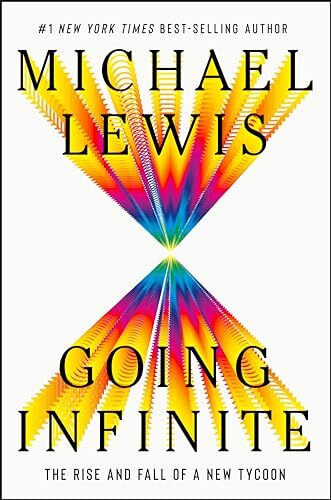 Going Infinite: The Rise and Fall of a New Tycoon By Lewis, Michael
Going Infinite: The Rise and Fall of a New Tycoon By Lewis, Michael Going Infinite
Lewis’s book begins by excavating Bankman-Fried’s childhood of isolation and game playing; a kid raised by professorial parents, perhaps in an atmosphere where reality and accountability were less valued than gaming… or the rule of law. As the story progresses, Lewis paints a portrait of Sam Bankman-Fried as, in some form or fashion, a savant man-child on a spectrum, who then surrounds himself with a motley crew of tech geeks—none of whom seem to truly understand the nuts and bolts of running a billion-dollar enterprise. However, these courtiers, after the money disappears, ultimately turn on Bankman-Fried, celebrating his demise like the kiddoes in William Golding’s novel, Lord of the Flies. Though under appeal at the time of this writing, the jury in the New York court case found Bankman-Fried guilty on all counts—but whether he purposely defrauded his investors through FTX and Alameda Research or that the business was grossly mis-managed is almost beside the point—the money is still in the ether. Or in someone’s offshore account.
So, at the end of the day, what is Sam Bankman-Fried’s true personality—is he a misunderstood genius, clueless as to corporate governance—or is he a sociopath and conman? Two things can be true at once. As Lewis unveils his deep-dive into Bankman-Fried, he portrays an intriguing young man running a multi-billion-dollar crypto business like a complex game, making up the rules as he went along. Christina Rolle, the Bahamas chief financial regulator, instrumental in effecting the country’s ‘open for business’ crypto stance, was quoted in Lewis’s book, as the end of FTX was near:
“It’s not hard to see you are being played by him [SBF], like a boardgame.”
It appeared that everything and everyone in Sam’s life was simply a game to be played.
Was the world simply distracted by the metronome of Bankman-Fried’s bouncing knee, seeing the ‘cool’ image rather than the man? In the financial world, due diligence is a basic requirement to analyze the veracity of company assets—and yet, if the assets are in crypto, evaluating worth can be as deceptive as a game of three-card monte. As the empire collapses, Lewis visits Bankman-Fried’s compound in the Bahamas, and then takes a precarious stab at the worth of the billion-dollar business on the ‘back of a napkin’, and declares that the $8 billion dollars is ‘there’ – no worries!!
In a multitude of interviews, Lewis has been wondered at for his, at times, apparent cheerleading of Bankman-Fried, even exclaiming during a heated exchange in a network interview, “I’m not stupid!” Of course you’re not an idiot, Michael, but the sad fact is, in a way, and like so many folks sucked into the crypto world—you got pranked. But, hey, that’s how the crypto cookie crumbles…
K.E. LANNING is an author and award-winning screenwriter, including a climate-fiction trilogy titled, The Melt Trilogy: A Spider Sat Beside Her, The Sting of the Bee, and Listen to the Birds. She has two works of commercial literary fiction in progress: Where the Sky Meets the Earth and The Light of the Sun. In addition, she’s published a series of book reviews and author interviews, including authors Emily St. John Mandel, Kazuo Ishiguro, Hugh Howey, Margaret Atwood, Andy Weir, Claire Vaye Watkins, and Cixin Liu.
September 7, 2023
A SPIDER SAT BESIDE HER

So honored that the pilot script of A Spider Sat Beside Her advanced to the Second Round of the Austin Film Festival!! Woohoo! This puts the screenplay into the top 20% of the festival.
June 24, 2023
All aboard?
Well, kids, a few bits and pieces to tell you about… With encourage and feedback from two award-winning screenwriters, Brian Weakland and Terry Gau, I wrote the TV Pilot for A Spider Sat Beside Her as a part of a limited series (THE MELT). Script in hand, I was then invited to join a screenwriters’ group of over 30 years, which has spawned talents such as Vince Gilligan of BREAKING BAD and BETTER CALL SAUL. Needless to say, I’m delighted to be a part of the Virginia Screenwriter’s Forum.
With a leap of faith, I entered the pilot screenplay into a slew of screenwriting contests. A few days ago, I was notified that the script for A Spider Sat Beside Her had won the Best TV Pilot Screenplay Award for Drama from the New York Screenwriting Awards … Wow! Cross fingers that I’m on track with this puppy, and a few more contests fall my way!
Now to get back to my current novel in progress…

December 15, 2022
Well... it's finally begun.

With encouragement from a mentor (or two) on the Virginia Screenwriters Forum, I’ve taken the plunge and am writing a screenplay adapted from my book, A Spider Sat Beside Her. I plan to present a ‘pilot’ episode early next year to the forum, and then begin submitting to screenwriting competitions. Ideally, this first story in The Melt Trilogy would kick off a potential limited series based on the three novels. Cross-fingers for me—chance are slim-to-none that it will go anywhere, but what the heck—it’s worth a shot!
I hope 2023 brings good health and Zen to us all.
K.E. Lanning
July 9, 2022
Lost in the Time of Covid
COVID finally caught me in the spring of 2022. The virus gripped me in a malaise of fatigue and pain—and despair. Surging blood pressure, coughing until my chest ached, exhaustion and brain fog—all demanding that I rest, rest, rest. Many nights, as I lay in bed, I would imagine and then reimagine scenes in my half-completed manuscript. But, as I tossed and turned, I wondered—would I live to finish this novel? Or would I die, leaving my words stranded? Days merged into weeks . . . and then months.
Sick and weak, I lay in my room, gazing at the changing nature outside my window. In April, the winds rolled like waves, the moan of each gust rising as it approached, bowing branches with tender leaves, showering pollen in its wake. In May, the leaves stretched to full length, trembling in passing breezes. In June, emerald leaves hung listless until puffy clouds gathered, then darkened and raced across the sky, heralding their arrival with bursts of lightning and growls of thunder, pummeling the earth with rain.
Somehow, it seemed appropriate that I read Marcel Proust’s In Search of Lost Time.
In Search of Lost Time
Written in the first person, Marcel Proust’s prodigious multi-volume novel is regarded as a loose version of his own life. The story begins with the narrator as a young boy, retiring early to his bed, listening to parties outside his room, and desperately missing his mother’s presence.
As the story unfolds, the narrator describes life in the fictional town of Combray believed to be modeled after the real village of Proust’s own childhood, Illiers, renamed in 1971 to Illiers-Combray in his honor. With lyric prose, he takes us with his family along walks through the village and countryside.
“…we would be met on our way by the scent of his lilac-trees, come out to welcome strangers. Out of the fresh little green hearts of their foliage the lilacs raised inquisitively over the fence of the park their plumes of white or purple blossom, which glowed, even in the shade, with the sunlight in which they had been bathed.”
Proust wrote visually. The reader yields to his immersive, detailed images, seen from the narrator’s eyes, of the beauty of the landscape, his daily encounters with family and friends, and the varied rooms in which he lives. And his tangled relationship with life itself.
But overshadowing the narrator, from childhood through his final days, is a debilitating asthma—each breath precious and illusive. The same disease which plagued Proust himself. He spent his last years confined to his bedroom, sleeping during the day and working at night on his novel. In 1922, one hundred years ago, Marcel Proust died of pneumonia at the age of fifty-one.
The Light at the End
An excerpt from Volume II, Within a Budding Grove, resonated with my state of mind as I finally imaged the light at the end of COVID:
“Once again I had escaped from the impossibility of sleeping, from the deluge, the shipwreck of my nervous storms. I feared now not at all the menaces that had loomed over me the evening before, when I was dismantled of repose. A new life was opening before me; without making a single movement, for I was still shattered, although quite alert and well, I savored my weariness with a light heart; it had isolated and broken asunder the bones of my legs and arms, which I could feel assembled before me, ready to cleave together, and which I was to raise to life merely by singing, like the builder in the fable.”
As the grass withers in the summer of 2022, I have returned to writing my novel, fed, in part, by hazy revisions in those midnight hours.
Karen (K.E.) Lanning www.kelanning.com , author of the cli-fi series, The Melt Trilogy: A Spider Sat Beside Her, The Sting of the Bee, and Listen to the Birds, and currently writing two commercial literary novels: Where the Sky Meets the Earth and The Light of the Sun.
April 6, 2022
Review on Emily St. John Mandel's 'Sea of Tranquility'

Author Emily St. John Mandel - photo credit, Sarah Shatz
Canadian author Emily St. John Mandel’s sixth novel, Sea of Tranquility, is graced with an idyllic title, but her apocalyptic work is far from peaceful. Her complex characters grapple with rumors of plague—and the reality of it—along with the aloneness of being human in derelict worlds of past and present.
Mandel, born in 1979 in Comox, British Columbia, Canada, was raised on the scenic Denman Island off of Vancouver Island. In this crucible of nature, she was homeschooled until fifteen years old, and then left high school at the age of eighteen to attend the School of Toronto Dance Theatre. Mandel currently lives in New York City with her husband and daughter.
In 2009, Mandel published her first novel, Last Night in Montreal, and then in 2010, released The Singer’s Gun, followed by The Lola Quartet in 2012. Mandel’s breakout moment came when her fourth novel, Station Eleven (published in 2014), won the 2015 Arthur C. Clarke Award and the Toronto Book Award. In addition, Station Eleven was shortlisted for the National Book Award and nominated for both the PEN/Faulkner Award for Fiction and the Baileys Women’s Prize for Fiction. The novel has been translated into 31 languages—and put Mandel firmly on the international literary scene.
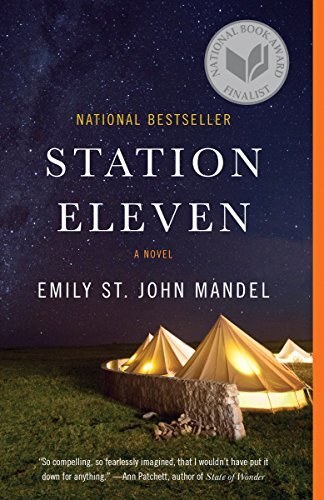 Station Eleven By Mandel, Emily St. John
Station Eleven By Mandel, Emily St. John Loosely based on Bernie Madoff’s infamous Ponzi scheme, Mandel published The Glass Hotel in 2020, in which her character, Jonathon Alkaitis, takes the reader along a tale of infamy, where deceit rips through the innocent and the gullible, their lives destroyed by insatiable greed. A line from the novel, “Money is its own country,” underlines the credence and allowance of our society to grant the rich—the aristocracy of the new world order—their own laws independent of those beneath them. And then the phrase, “Why don’t you swallow broken glass,” is mysteriously etched on a windowpane of the isolated Hotel Caiette, owned by Alkaitis, illustrating the paradox of having it all and yet having nothing. The novel was shortlisted for the Giller Prize and in 2019, NBC Universal International Studios acquired the rights to turn the story into a TV series.
In her upcoming novel, Sea of Tranquility, Mandel strums our instinctual human anxieties, interweaving disparate stories on warped and tangled strands of time. The character Edward muses in his exile to British Columbia, that, “This place is utterly neutral on the question of whether he lives or dies … it doesn’t care about his last name or where he went to school,” underlining that Nature is indifferent to us—we either eat or are eaten—a zero-sum game to the universe. In the timeline of one character, author Olive Llewellyn, a pandemic hits, crashing onto lives who’ve denied their vulnerability or refused to believe the apocalypse had finally arrived—until the final capitulation of acknowledgement, “We knew it was coming.”
Mandel’s flawed characters are expertly choreographed through centuries of time and space, human beings who are simply trying to live their lives in a complex and chaotic world. Perhaps her character, Gaspery, in Sea of Tranquility says it best, describing life on the edge: “A whiff of disorder that I found invigorating.”
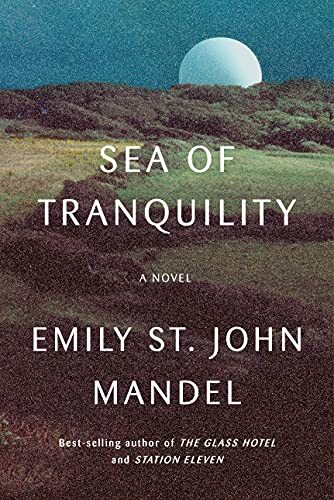 Sea of Tranquility: A novel By Mandel, Emily St. John
Sea of Tranquility: A novel By Mandel, Emily St. John Please check out my interview with Emily St. John Mandel on The Millions!
Karen (K.E.) Lanning www.kelanning.com , author of the cli-fi series, The Melt Trilogy: A Spider Sat Beside Her, The Sting of the Bee, and Listen to the Birds, and currently writing two commercial literary novels: Where the Sky Meets the Earth and The Light of the Sun.

Author K.E. Lanning, photo credit V Paulk
December 31, 2021
Dissent
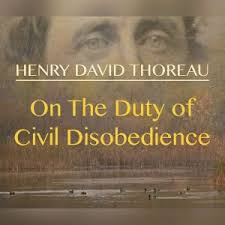
Yesterday, I ran across a copy of Henry David Thoreau’s famous essay, On the Duty of Civil Disobedience. As I reread his essay, originally published in 1849, his words once again resonated in this era of peaceful marches against police brutality committed upon our fellow citizens.
In Thoreau’s time, the stakes were even higher—an abolitionist, he advocated withdrawing support of the government and in his case, stop paying taxes, to protest slavery and the Mexican-American war waged by an expansionist United States.
“Under a government which imprisons any unjustly, the true place for a just man is also a prison.... where the State places those who are not with her, but against her,—the only house in a slave State in which a free man can abide with honor.... Cast your whole vote, not a strip of paper merely, but your whole influence. A minority is powerless while it conforms to the majority; it is not even a minority then; but it is irresistible when it clogs by its whole weight. If the alternative is to keep all just men in prison, or give up war and slavery, the State will not hesitate which to choose. If a thousand men were not to pay their tax bills this year, that would not be a violent and bloody measure, as it would be to pay them, and enable the State to commit violence and shed innocent blood. This is, in fact, the definition of a peaceable revolution, if any such is possible. [...] But even suppose blood should flow. Is there not a sort of blood shed when the conscience is wounded? Through this wound a man's real manhood and immortality flow out, and he bleeds to an everlasting death. I see this blood flowing now.”
In an eloquent excerpt, Thoreau writes:
“If the injustice is part of the necessary friction of the machine of government, let it go, let it go: perchance it will wear smooth—certainly the machine will wear out. If the injustice has a spring, or a pulley, or a rope, or a crank, exclusively for itself, then perhaps you may consider whether the remedy will not be worse than the evil; but if it is of such a nature that it requires you to be the agent of injustice to another, then I say, break the law. Let your life be a counter friction to stop the machine. What I have to do is to see, at any rate, that I do not lend myself to the wrong which I condemn.”
From On the Duty of Civil Disobedience, H.D. Thoreau, 1849
[image error]Mahatma Gandhi, impressed by Thoreau’s arguments, wrote in 1907,
“Thoreau was a great writer, philosopher, poet, and withal a most practical man, that is, he taught nothing he was not prepared to practice in himself. He was one of the greatest and most moral men America has produced. At the time of the abolition of slavery movement, he wrote his famous essay On the Duty of Civil Disobedience. He went to gaol for the sake of his principles and suffering humanity. His essay has, therefore, been sanctified by suffering. Moreover, it is written for all time. Its incisive logic is unanswerable.”
— "For Passive Resisters" (1907)
In his quest for liberty from Britain, Gandhi adopted peaceful civil disobedience and ultimately won independence in 1947. “Civil disobedience becomes a sacred duty when the state becomes lawless and corrupt.”
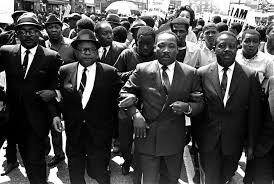
Martin Luther King, Jr. wrote in his autobiography:
“During my student days I read Henry David Thoreau's essay On Civil Disobedience for the first time. Here, in this courageous New Englander's refusal to pay his taxes and his choice of jail rather than support a war that would spread slavery's territory into Mexico, I made my first contact with the theory of nonviolent resistance. Fascinated by the idea of refusing to cooperate with an evil system, I was so deeply moved that I reread the work several times.
I became convinced that noncooperation with evil is as much a moral obligation as is cooperation with good. No other person has been more eloquent and passionate in getting this idea across than Henry David Thoreau. As a result of his writings and personal witness, we are the heirs of a legacy of creative protest. The teachings of Thoreau came alive in our civil rights movement; indeed, they are more alive than ever before. Whether expressed in a sit-in at lunch counters, a freedom ride into Mississippi, a peaceful protest in Albany, Georgia, a bus boycott in Montgomery, Alabama, these are outgrowths of Thoreau's insistence that evil must be resisted and that no moral man can patiently adjust to injustice.”
— The Autobiography of Martin Luther King, Jr.
King made nonviolent protests a key component to his civil rights activism. “Mass civil disobedience can use rage as a constructive and creative force.”

On this New Year’s Eve of 2021, I remember the crowds of people over these last years, in the midst of a pandemic, peacefully assembling in towns and cities across the world for those who have wrongly died in the hands of law enforcement. For eight minutes and 46 seconds we knelt for George Floyd, with the words, “I can’t breath,” pounding in our minds and hearts. For, as citizens, we must demand justice—it is not only our right, but our duty.
K.E. Lanning



